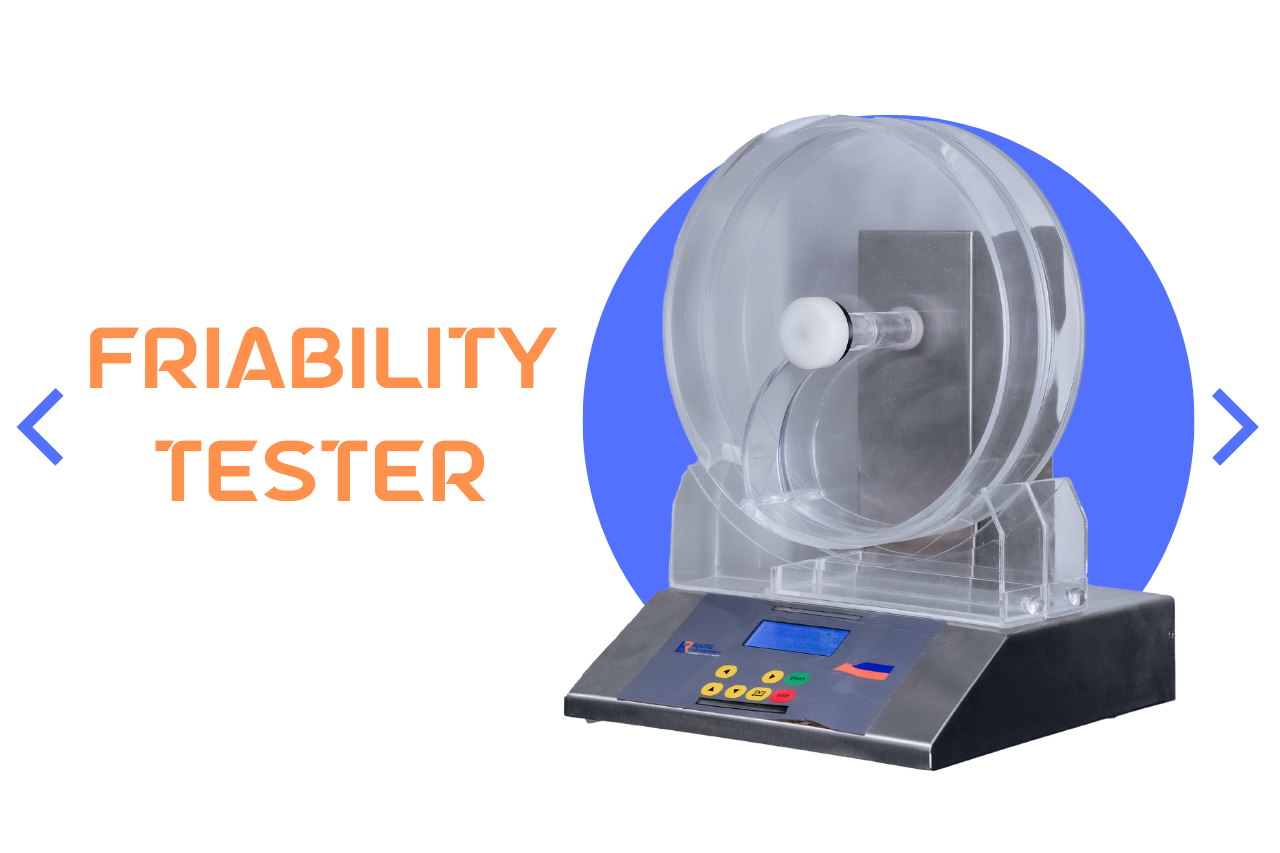Welcome to the world of pharmaceutical testing, where ensuring the quality and durability of tablets is key. Among the heroes in this field is the Tablet Friability Tester, a tool that plays a crucial role in pharmaceutical manufacturing.
RAISE LAB EQUIPMENT stands out by producing top-notch tablet friability apparatus that meet standards set by USP, EP, JP, IP norms and are fully compliant with CFR21 PART 11. This machine tests if a tablet can handle being moved around without breaking apart.
It’s like seeing if a cookie crumbles before you get to enjoy it. If you’ve ever wondered how your medicine stays in one piece until it reaches you, keep reading to uncover the secrets behind tablet testing!
Key Features of Tablet Friability Tester
Tablet Friability Testers, such as the Key International RFT-2V Tablet Friability Tester, are designed to ensure tablets can endure stress without breaking. They accurately measure a tablet’s resistance to wear and tear using the USP prescribed method.
These devices simulate conditions encountered during coating, packing, and transportation processes to predict weight loss effectively.
These testers comply with both USP (United States Pharmacopeia) and EP (European Pharmacopoeia) standards, guaranteeing their reliability across international pharmaceutical practices.
They come equipped with advanced features like three-level password protection for enhanced security among admin, supervisor, and user levels. Additionally, they boast data storage capabilities capable of holding up to 1500 reports and storing up to 20 recipes for various testing requirements.
With compliance to CFR21 PART 11 regulations and an inbuilt printer for immediate reporting, these machines blend accuracy with convenience for thorough quality control measures in tablet formulation.
Compliance to USP and EP standards
Compliance to USP and EP standards is crucial for ensuring the quality and safety of pharmaceutical tablets. The RFT-1V and RFT-2V Friability Testers are designed to meet these rigorous pharmacopeial standards, including USP <1216>, EP <2.9.7>, and JP <14>.
This adherence confirms that these instruments can accurately assess tablet resistance to mechanical stress, such as chipping and surface abrasion. Such testing is essential in pharmaceutical manufacturing regulations.
Manufacturers rely on equipment like RAISE LAB EQUIPMENT automated friability testing instruments because they align with the latest requirements of the USP monograph and EP for friability testing.
This guarantees that their tablets can withstand the wear they might encounter during packaging, shipping, and handling while maintaining drug quality control. Meeting these compliance standards helps ensure that only high-quality products reach consumers, reinforcing trust in pharmaceutical brands.
Types of Tablet Friability Tester
Tablet friability testers come in various types – single drum, dual drum, and models with variable or fixed RPM. Each type offers distinct features to accommodate different testing needs and requirements.
Single drum
Single drum tablet friability testers are readily available and offer a cost-efficient solution for testing the durability of pharmaceutical tablets. Compliant with USP/EP/JP standards, this type of friability tester is designed with a rotating drum that can hold tablets or specimens for testing.
Equipped with two transparent acrylic drums, it ensures highly reproducible results, providing quality control testing within the pharmaceutical industry.
Moving on to “Dual drum” configuration, let’s explore how it differs from single drum options.
Dual drum
Transitioning from the single drum configuration, the dual drum tablet friability tester is a versatile and efficient testing machine that comes equipped with two drums. This setup allows for simultaneous testing of abrasion and friability, enhancing the speed and efficiency of the testing process.
The dual-drum design ensures compliance with USP, EP, and JP standards for tablet friability testing, providing accurate and reliable results.
Manufactured in accordance with USP <1216>, EP <2.9.7> and JP <14> standards, this configuration of the tablet friability tester enables automatic calculation of weight loss while recording weight readings from the balance.
Variable RPM
Tablet friability testers with variable RPM feature enable operators to subject tablets to varying stresses during testing. This adjustable rotational speed, typically at 1 rpm intervals, offers precise control over the evaluation of tablet strength and wear.
The ability to simulate different levels of shock and abrasion is critical for assessing tablet durability in manufacturing and transportation scenarios.
The feature allows for controlled tablet abrasion and breakage assessment, crucial for reproducing real-world conditions accurately. Additionally, some testers offer a variable lock speed mode and drum rotation speed to accommodate different types of tablets efficiently.
Variable RPM plays a vital role in ensuring highly reproducible and cost-efficient friability testing across various tablet types.
Fixed RPM
The tablet friability tester utilizes a fixed rotation speed of 25 RPM. Alternatively, users have the flexibility to program speeds within the range of 20-75 RPM. A membrane keypad enables precise control of the rotation speed in increments as small as 1 RPM.
Importance and Uses of Tablet Friability Tester
Tablet friability testers are vital for assessing the durability and strength of pharmaceutical tablets. They are extensively used to determine a tablet’s resistance to breakage, chipping, and crumbling during manufacturing, coating, packaging, and distribution processes.
These testers provide standardized and reproducible methods for measuring a tablet or its coating’s tendency to chip or powder under stress.
Additionally, tablet friability testing helps in establishing acceptance criteria for tablet quality by identifying factors such as poor tablet design with sharp edges that may influence the tablets’ friability.
Ultimately, this test is crucial for ensuring the overall quality and integrity of compressed tablets in the pharmaceutical industry.
Conclusion
Assessing tablet friability is crucial for ensuring the durability of tablets during various stages. Using a tablet friability tester helps to determine the physical strength of uncoated compressed tablets and verify their resistance to breakage under mechanical stress.
Compliance with USP and EP standards is essential in pharmaceutical manufacturing. This testing equipment contributes to quality control by predicting tablet weight loss and evaluating transportation durability.
Investing in a tablet friability tester can enhance laboratory efficiency while providing accurate results for solid dosage form testing.


